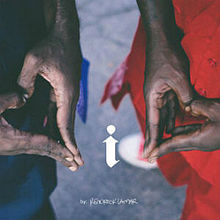Y'all, have I got a musical journey for you. Kaitlin McGaw and Tommy Shepherd, the two musicians behind the Bay Area hip hop band Alphabet Rockers, have put together an epic list of songs and albums as part their entry into my "How I Got Here" series. Soooo many cuts and classic albums to share with your kids or just enjoy by yourself, all cited as influences on their way to their latest EP, The Playground Zone.
What would make two people, one from LA and the other Boston - a “white girl from Harvard” and a “black drummer/beatboxer of 1000 stages” - come together to not only to work together, but to make music? Hip hop music - and kids music at that?
It was hip hop. Not just a song, or a dance. It was a statement that we both were writing in our lives.
See, the music that influenced us is actually a crate of records. Our collaboration wasn’t just Carole King meets Fishbone, or Green Day meets Mary J. Blige though it was a “Share My World” (MJB, 1997) moment. We lived in different places and gained knowledge from different lives, but we had a collective deck of riffs on lyrics, melodies, rhymes and stories from decades of music history.
This is why hip hop is not just rap. It’s a world made by everything music. And for us, hip hop was life. What’s crazy about the influences within hip hop - you have the nerdy voice of “Back in the Day” (Ahmad, 1994) with eyes on everything. You’ve got the story that needs to be told -Slick Rick’s “Children’s Story.” The sport of incredible rhyme. The majesty of hooks that you sing on a loop - even knowing they are a remix of a melody of years past. The songs with beats that are so fierce you hardly hear the message until you’ve stopped blasting it and sweating it out - and actually hear what it’s about.
Hip hop was “The Message” (Grandmaster Flash & the Furious Five). It was the freedom, it was the creativity, the connection, the community, the learning about the world through someone’s eyes. It was the DJ who knew the Top 40 and the basement tapes - and could mix and create something both vaguely familiar and totally “fresh” and new. It was the moves that pushed you into expression from your soul, cracking and swerving to every turn the music took. The beats that made you stop and make a stank face because it's that good. The story that changes your entire life.
We started working together with a shared love of A Tribe Called Quest and the “Native Tongue” family in general. Years on the road, riffing between shows, revealed hundreds of songs that threaded together humor and wordplay, and a deck of music ranging from Christopher Cross to Kris Kross. Joni Mitchell to Janet Jackson with a Q-Tip.
The beginning of our work was about bringing hip hop to life on stage. It was about creating space for kids and parents to be who they are within this “freedom culture” and giving access to that hip hop deck of experiences while letting parents know we had the references to all the music they played out in their lives. We played out our lives in hip hop in the way we created with the kids. It led us to an incredible place in making our latest album The Playground Zone.
What was missing for us in our work was how to tell the stories that really mattered to us - our message and our truth. We went back to the drawing board of musical influences to bring out the sounds and experiences we wanted to create. We spent time with J. Dilla and The Roots albums. We debated about old school vs. classic and pop hip hop music - and the way music and messages impacts our audience. We are a dance-driven crew of creators aiming to make kids see that they are in the center of the cypher - that everything they share changes the world around them. And the music impacted us just as it changed the way our audience related to each other, making new connections and asking us to keep going deeper with the message and the motivation.
So we are on the next wave, writing and creating with hitmaking pop/hip hop/trap producers from around the country. We’re rooted in the old school as it is our history that drives us forward. We’re riffing over the chopped up tracks thinking of our classic faves. And we’re changing cadence and timing to tell the story for today’s tomorrow.
We are two individuals who began on opposite coasts, in a country where our lives would be absolutely different based on the skin we’re in. The both of us, absorbing all information and influences from the diverse American and world cultures, rendering our own voices and deciding what to do with them to be of service to the world. And yes, every step of it was musical. Our future is to be a source of musical memory for all of the kids who are questioning how they fit in this America and asking, is it me? We create for them now, to clarify through music, beats, message and movement, that they belong - with us, in hip hop. And that together we will change that world that is making it tough for them to feel like this is a place they can be “Free to be You and Me” - but it’s a place they can shout “I love myself” (Kendrick Lamar, “i”).














